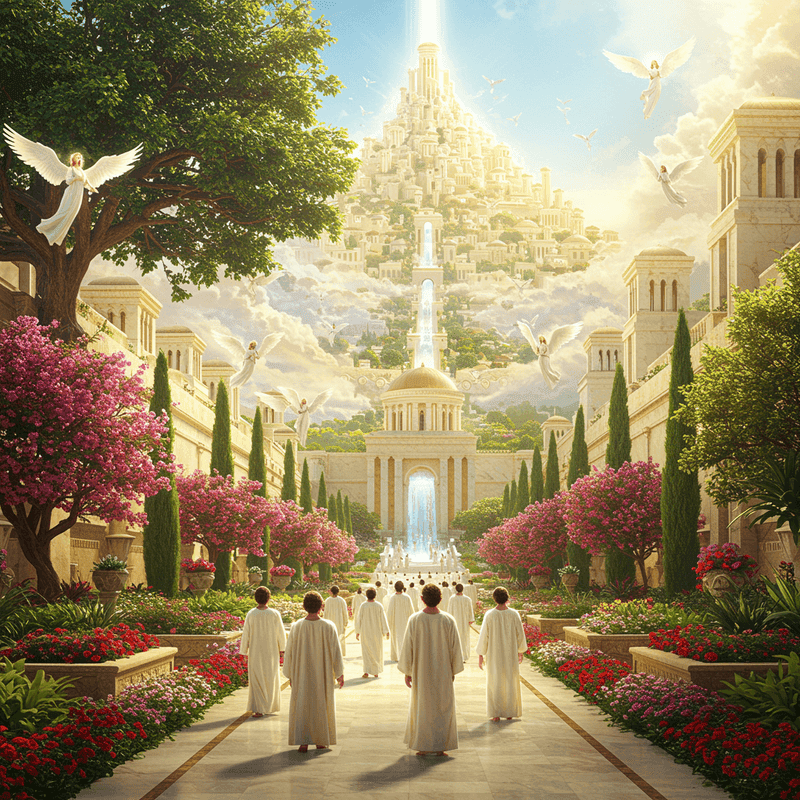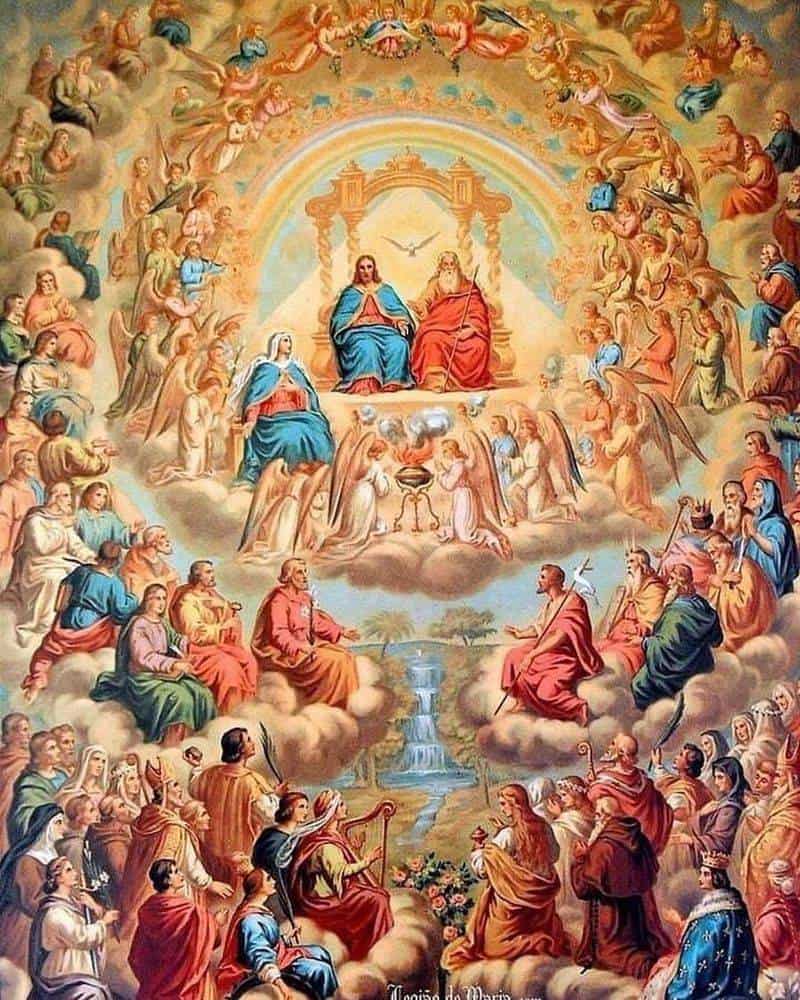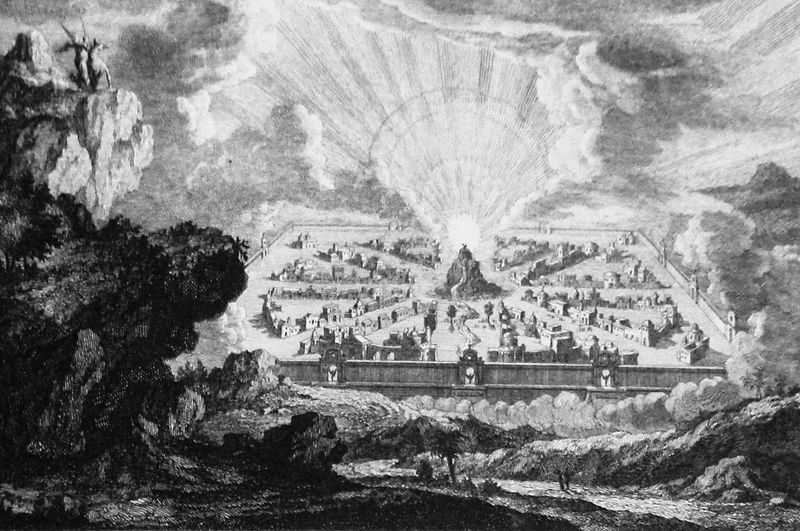Heaven has captured human imagination for thousands of years, inspiring art, music, and countless conversations about what awaits us after death.
Yet despite all this interest, many of our common beliefs about heaven come more from movies, cartoons, and popular culture than from actual religious teachings.
Understanding what heaven truly represents can bring comfort, clarity, and a deeper appreciation for spiritual beliefs.
1. Heaven Is Just Clouds and Harps
Popular cartoons show people floating on clouds while strumming harps, but religious texts paint a very different picture. Biblical descriptions actually present heaven as a real, physical place with solid structures and tangible features. The book of Revelation describes streets made of gold, gates crafted from enormous pearls, and walls adorned with precious stones.
Rather than a foggy, ethereal realm, heaven is portrayed as the New Jerusalem, a magnificent city full of life and activity. There are rivers, trees bearing fruit, and beautiful architecture that suggests a place more real than our current world. This physical description means heaven might be far more familiar and wonderful than we imagine.
2. People Turn Into Angels After Dying
Movies love showing deceased loved ones earning their wings, but scripture tells a completely different story. Angels and humans are distinct creations with separate purposes and natures. Angels were created as spiritual beings specifically to serve as messengers and servants of God.
Humans, even in heaven, remain human—just perfected versions of themselves. The Bible describes angels as “ministering spirits” with their own roles and responsibilities. When believers reach heaven, they receive glorified bodies but never transform into a different species entirely.
This distinction matters because it means we maintain our human identity, relationships, and unique personality forever. Your essence remains you, just freed from sin and suffering.
3. Heaven Will Be Boring and Monotonous
Nothing sounds worse than eternal boredom, which is probably why some people dread the idea of heaven. But scripture describes believers actively serving, reigning with Christ, and engaging in meaningful work. Revelation speaks of responsibilities, governance, and creative pursuits that give purpose to heavenly existence.
The New Jerusalem buzzes with life—rivers flow, trees produce monthly harvests, and nations bring their glory into the city. Far from sitting idly on clouds, residents of heaven participate in dynamic activities that bring fulfillment and joy.
Imagine pursuing every interest you never had time for, creating without limitation, and exploring without exhaustion. Heaven promises adventure, growth, and endless discovery rather than monotonous repetition.
4. Good People Automatically Go to Heaven
Many assume heaven operates like a cosmic report card where good deeds outweigh bad ones. Religious teaching emphasizes something radically different—entrance depends on faith rather than personal merit. Ephesians clearly states that salvation is a gift, not something earned through accomplishments or moral behavior.
This doesn’t mean good deeds are worthless; they’re important expressions of faith and love. However, they’re not the ticket into heaven. Even the kindest person falls short of perfection, which is why grace becomes necessary.
Understanding this removes the pressure of trying to be “good enough” and shifts focus to relationship and trust. Heaven becomes accessible not through exhausting self-improvement but through accepting an offered gift.
5. Heaven Never Changes or Evolves
Some picture heaven as frozen in time, unchanging for all eternity. Revelation speaks of “a new heaven and a new earth,” suggesting transformation and renewal rather than static existence. This indicates heaven undergoes development, growth, and positive change.
The concept of newness implies fresh experiences, discoveries, and developments throughout eternity. God’s creativity doesn’t stop at creation; it continues expressing itself in ever-unfolding ways. Heaven represents not a museum but a living, growing reality.
This dynamic nature means eternal life won’t feel repetitive or stale. Each moment brings opportunities for new experiences, deeper understanding, and fresh expressions of joy. Change in heaven always moves toward greater beauty and fulfillment.
6. Everyone Gets Identical Rewards
A common assumption suggests everyone in heaven receives exactly the same experience and recognition. Scripture indicates that while everyone shares in eternal life, rewards vary based on faithfulness and actions during earthly life. Jesus spoke of repaying each person according to their deeds.
This doesn’t create competition or jealousy but acknowledges that choices matter and faithfulness is recognized. Different levels of responsibility, honor, and reward exist based on how people stewarded their opportunities on earth.
Think of it like graduation—everyone celebrates together, but some receive special honors for exceptional achievement. These distinctions enhance appreciation rather than diminishing joy, as everyone finds complete fulfillment in their unique role and reward.
7. All Religions Lead to the Same Heaven
Modern thinking often suggests all spiritual paths ultimately reach the same destination. Jesus made a strikingly exclusive claim when he stated that no one comes to the Father except through him. This assertion challenges popular pluralistic views about religion.
While this teaching may seem narrow or intolerant, it reflects the belief that truth is specific rather than relative. Different religions make contradictory claims about God, salvation, and the afterlife, so they cannot all be equally correct.
Understanding this belief helps clarify why evangelism matters to Christians—they believe they’ve found the exclusive path and want to share it. Whether one agrees or not, recognizing this teaching helps understand Christian theology about heaven’s entrance requirements.
8. Heaven Is Far Away in Outer Space
Cartoons often depict heaven as a distant location somewhere beyond the stars. Biblical prophecy describes heaven eventually coming to earth rather than believers permanently leaving earth for a faraway realm. Revelation portrays the New Jerusalem descending from heaven to a renewed earth.
This means the ultimate destiny involves heaven and earth merging together. Rather than escaping to a distant dimension, believers will inhabit a perfected physical world. God’s plan restores creation rather than abandoning it.
This teaching emphasizes that physical existence matters and will continue in glorified form. The separation between heaven and earth is temporary, with the ultimate goal being their beautiful integration into one perfect reality.
9. We Will Forget Our Earthly Lives
Some worry that heaven requires erasing all memories of earthly existence, including relationships and experiences. Scripture suggests continuity rather than complete amnesia about our past. Recognition and relationship appear to continue, as biblical accounts show people knowing and recognizing others in the afterlife.
While painful memories will be healed and their sting removed, the experiences that shaped us likely remain part of our identity. The promise that God will wipe away every tear suggests healing rather than deletion of memory.
Our earthly journey contributes to who we become eternally. Those relationships, lessons, and experiences form our unique story, which continues rather than ends. Heaven perfects our story rather than erasing its previous chapters.
10. Heaven Is Only About Worshiping Non-Stop
The idea of endless worship services sounds exhausting to many people. While worship certainly occurs in heaven, it’s not the only activity filling eternity. Scripture describes varied activities including governing, creating, exploring, learning, and building relationships.
Worship in heaven likely differs dramatically from earthly religious services. It might involve creative expression, joyful celebration, and natural responses to experiencing God’s presence rather than rigid, formal ceremonies. Everything done in heaven becomes an act of worship when done in love and gratitude.
Think of worship less as a specific activity and more as the atmosphere in which all activities occur. Working, playing, creating, and relating all become expressions of worship when done in perfect harmony with God’s presence and purposes.











